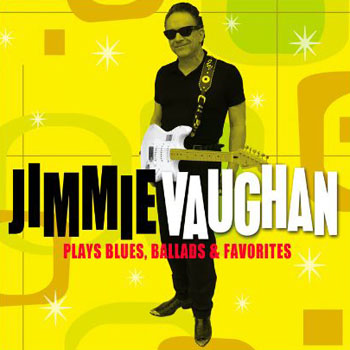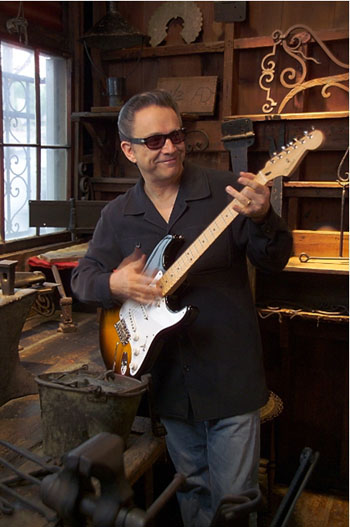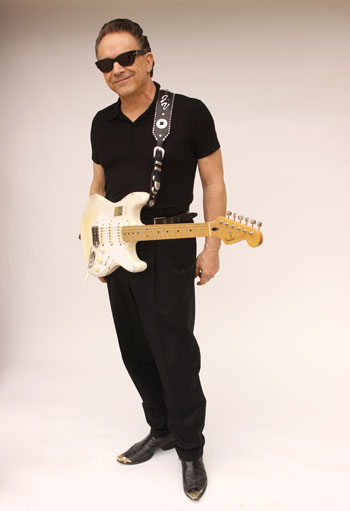Guitar heroes don't come much humbler than Jimmy Vaughan. A
true Texan guitar legend who started the groundbreaking Fabulous
Thunderbirds and taught his brother Stevie Ray Vaughan how to
play has now become a double Grammy award winning recording
artist.
Yet at the heart of the adulation and respect is a man who is
just happy to play the music he loves.
Pete Feenstra talks to Jimmy about his new album 'Blues Ballads
& Favorites' on Proper Records and the historical moments in his
stellar career.
How did you get hooked up with Proper Records? They seem to be
the perfect label for you, a roots friendly label as well as
distribution company?
Yeah you are right they really are the perfect home for me.
The label owner Malcolm and his partners came over to see me in
Austin. We had lunch and talked about the music and how they
wanted me to make a 'proper' record.
They know their music and so do I, so that was a good start. And I
was interested because I'm a real fan of what they do. They
believe in the music and I thought, well if they didn't believe
in it they would be busy recording hip hop or something else. So
it's a great situation for me.
Was the new album something you had in mind for a long time, or
was it inspired by the success of 'On The Jimmy Reed Highway'?
Well there wasn't really a great big plan as such. I just
like to play and everything sort of hooked up with everything
else. In this case the Jimmy Reed album got me a lot of exposure
again. But I think actually it was a friend mine who said 'if I
was your manager I would get you to record the old blues
classics' And I thought that's not such a bad idea and that's
really how it all got started.
How did you find the material for the new CD. Was it a case of
just recording the songs you already play, or was it songs you
always wanted to play someday?
Some of the stuff I already had in mind. Some of the songs I
thought would be fun to play, some of it I was already playing
and some of it came from other people's ideas. But when you love
music from a particular era you don't have to search very hard.
It was said about the 'Jimmy Reed' album that you transport the
listener back in time to the mid-1950s, is that also true of
this album?
Well I've said that too, but for me it's really about being
able to play the music that I like, just my favourite stuff from
that era. But I also like music from the 40's and early 60's
too. And if I can play this stuff live and then get the
opportunity to record it then I'm a happy man. It's what I
really want to do.
Do you think there was a danger that some of the classic R&B by
Don & Dewy, Roy Milton etc has been overlooked?
I didn't specifically think about it in that way. But having
re-listened to some of the material and recorded it, as well as
now playing it live again, I did think that if I'm helping focus
people back to this music then it's a good thing, yes.

Was having Lou Ann Barton on board crucial to making the album
work?
There are a couple of great duets with Lou Ann Barton
especially on Jimmy Reed's 'Come Love'?
Yes it really was. For one thing she's been on all of my records
and of course she was in the original Fabulous Thunderbirds as
well. I had her in mind for some of the songs we were going to
do, plus I thought she should tour with us.
I guess it was the same with Greg Picollo and the horn
arrangements?
Oh yeah, same thing. He arranges the horns and really
understands the music from that era. He used to be into the same
music with Roomful of Blues. He was also there on both Do You
Get The Blues? and 'On The Jimmy Reed Highway', so it made sense
that he was going to be part of this project.
I guess given the nature of some of the songs, you had to think
carefully about the arrangements, particularly given the mixture
of rock and roll and gospel. I'm thinking about songs like Teddy
Taylor's 'I Miss You So' which he originally sang as a falsetto?
Yes that song in particular took some thinking about. I love
some of the stuff that Teddy did but for this I was looking for
a 'boy/girl' duet thing and it works so well with Lou Ann.
I also always wanted to record a song with a phone ringing on it
(laughs); you know Pee Wee Crayton's done it, Bobby Bland's done
it and now me.

I also wonder about songs like 'Wheel of Fortune' which LAB
sings brilliantly, how did you conceive of a song like that
being presented in a contemporary setting?
Actually it was Eric Clapton who came up with that idea. We were
playing somewhere in Ohio I think and after the show he came up
to me and said Lou Ann Barton should record that song with you,
she's perfect for Wheel of Fortune' and he was right! It is
still sounds great all these years later.
Do you realise how great it is to see you with a full band like
this after looking at the small liner notes on hundreds of CD's
coming out of Austin?
More and more so as people come up to you. You know we just
play. We're old timers doing our stuff. I've played years with
people like my drummer George Raines. You just keep going and if
people still come out to see you that's great. It's the same
with what you said earlier about the interest in Europe. When we
first set out it was a natural thing of playing the music you
love. The fact that people in Europe share your passion and love
your playing is great.
Your own song 'Coming & Goin' nicely brings the project full
circle. Did you consider adding a few more of your own songs?
Well I'm always doing my own songs and still writing new
stuff of course. Maybe that particular song fitted in well, but
as the project developed I got into the 50's era, so maybe
they'll come out another time.
Do you see yourself as a conduit in connecting the blues of the
past with the present?
Well I can understand why some people can see me as some
kind of musical throwback and I'm not hiding the connections
between then and now. But it's more a case of playing what I
like rather than just going out there and presenting nostalgia.
You got a Grammy for both 'Do You Get The Blues? in 2001, and
2007's 'On The Jimmy Reed Highway', did those awards vindicate
your life long commitment to the blues?
You know it's always nice to be mentioned in that way. It's
great to win awards and to be recognised for what you do but for
me it is simply the fact that I am able to play that keeps me
going. As long as I can still have fun playing guitar, that's
all that matters because it's what I do.
Looking back on the Fabulous Thunderbirds can you see the irony
in the fact that you didn't enjoy commercial success until after
you'd recorded your best stuff?
I don't know about irony but we had self belief and the gigs were
still doing OK so we kept going.
What was the biggest reason for picking up the guitar again
after Stevie Ray's passing?
Well in one way I never stopped playing at all. But I didn't
really wish to play in public again for a while. I didn't really
want all those people coming up to me telling me how sorry they
were.
It took me a while to realise those things and to share their
experience. It was just that I didn't want to hear it at the
time. That was my way of dealing with things I guess.
It was Eric Clapton who brought me back to public playing at his
Albert Hall shows. He showed me that I still had a real need to
play.
Finally, back in'69 you opened for Jimi Hendrix. Was that a
meeting of musical minds or were you miles apart?
You know I was a kid and he was Jimi Hendrix a musical giant. It's
one of those things in your life you don't forget but we were
miles apart in terms of music.
I really didn't know what to say and do at the time, but I was
just happy to be on the same bill as him.
Interview © June 2010 Pete Feenstra




